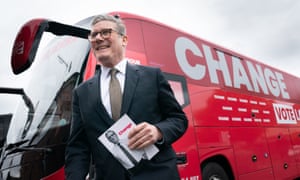Central to Labour’s campaign over the last few weeks has been one key message: that the party, should it win the election on 4 July, will be a force for stability after years of political turmoil.
Keir Starmer’s economic pledges have been aimed to be reassuring and cautious: no big increases in public spending, no big tax rises and a commitment to keep to the current fiscal rules on debt.
It is an offer explained not only by economic thinking but by political strategy, in an attempt to escape the party’s reputation for recklessness with the country’s finances.
Nevertheless, it is a plan beset by risk. As the Guardian’s special correspondent Heather Stewart explains to Michael Safi, voters are looking not just for stability but for a government to turn the economy around, to invest, and to fix crumbling public services.
If the party does take office on 5 July, has it already boxed itself in too much? And how can it reconcile a public desperate for change and an economic plan that promises much of the same?

Photograph: Stefan Rousseau/PA Wire
Support The Guardian
The Guardian is editorially independent.
And we want to keep our journalism open and accessible to all.
But we increasingly need our readers to fund our work.







